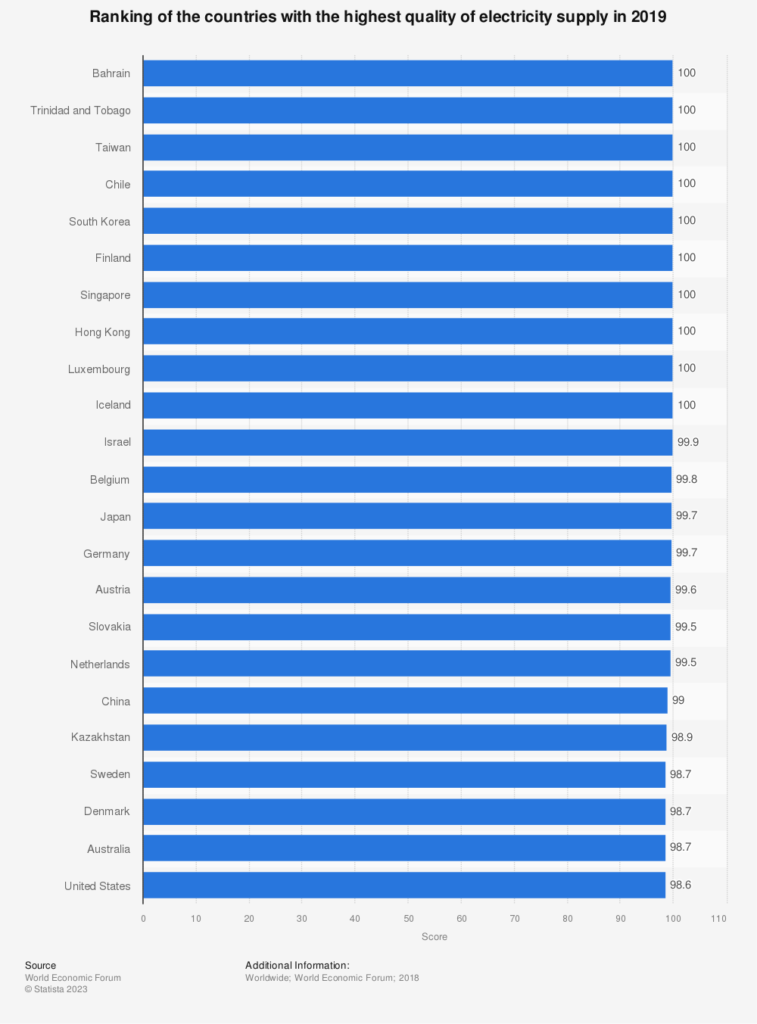Which country has best electricity?

Electricity is a vital resource that powers our modern world. Access to reliable and efficient electricity infrastructure is crucial for various aspects of life, including economic growth, healthcare, education, and overall quality of life. In this article, we will explore the countries that boast the best electricity infrastructure, the benefits of reliable electricity, challenges faced by countries with poor infrastructure, and the innovative solutions being implemented to improve electricity infrastructure.
- Factors to Consider
- Top Countries with Best Electricity Infrastructure
- Benefits of Reliable Electricity
- Challenges Faced by Countries with Poor Electricity Infrastructure
- Improvements and Innovations in Electricity Infrastructure
- Conclusion
-
Frequently Asked Questions
- 1. What criteria are used to determine the best electricity infrastructure?
- 2. Which country currently ranks first in terms of electricity infrastructure?
- 3. How does reliable electricity benefit a country's economy?
- 4. What are some innovative solutions being implemented to improve electricity infrastructure?
Factors to Consider
When determining the best electricity infrastructure, several factors come into play. These factors include:
- Availability: The percentage of the population with access to electricity.
- Reliability: The frequency and duration of power outages.
- Quality: The stability and consistency of the electricity supply.
- Sustainability: The use of renewable energy sources and efforts to reduce environmental impact.
- Infrastructure: The overall state and efficiency of the electricity grid and transmission lines.
Top Countries with Best Electricity Infrastructure
Based on these factors, several countries have emerged as leaders in electricity infrastructure:
- Norway: With its abundant hydroelectric resources, Norway tops the list with nearly 100% access to electricity and a highly reliable and sustainable grid.
- Switzerland: Known for its efficient and well-maintained grid, Switzerland has a high rate of electricity access and minimal power outages.
- Sweden: Sweden excels in renewable energy sources, particularly wind and biomass, contributing to its robust and sustainable electricity infrastructure.
- Germany: A pioneer in renewable energy, Germany has made significant investments in solar and wind power, resulting in a reliable and environmentally friendly electricity grid.
- Japan: Despite being a densely populated country with limited natural resources, Japan has managed to build a highly resilient and efficient electricity infrastructure.
Benefits of Reliable Electricity
Reliable electricity infrastructure brings numerous benefits to a country:
- Economic Growth: Industries rely on uninterrupted power supply to operate efficiently, attracting investment and driving economic growth.
- Education and Healthcare: Reliable electricity is essential for schools, hospitals, and medical facilities to provide quality education and healthcare services.
- Improved Quality of Life: Access to electricity improves living conditions, enabling better lighting, heating, and access to electronic devices.
- Technological Advancements: Reliable electricity infrastructure fosters innovation and technological advancements, propelling a country forward.
Challenges Faced by Countries with Poor Electricity Infrastructure
Countries with poor electricity infrastructure face various challenges:
- Limited Development: Insufficient access to electricity hampers economic development and slows down progress in various sectors.
- Healthcare and Education Obstacles: Lack of reliable power supply negatively impacts healthcare services and educational opportunities.
- Poverty and Inequality: Inadequate electricity infrastructure widens the gap between the rich and the poor, hindering social development.
- Environmental Impact: Countries heavily reliant on fossil fuels for electricity generation contribute to environmental degradation and climate change.
Improvements and Innovations in Electricity Infrastructure
Efforts are being made worldwide to improve electricity infrastructure:
- Renewable Energy Integration: Countries are increasingly adopting renewable energy sources like solar and wind power to reduce reliance on fossil fuels.
- Smart Grid Technology: Advanced grid systems are being developed to enable better monitoring, control, and efficient distribution of electricity.
- Microgrids and Decentralization: Microgrids are being implemented to provide localized and reliable power supply, especially in remote areas.
- Energy Storage Solutions: Innovative storage technologies, such as batteries and pumped hydro storage, help balance the intermittent nature of renewable energy sources.
Conclusion
Access to reliable and efficient electricity infrastructure is vital for the progress and well-being of a country. Countries like Norway, Switzerland, Sweden, Germany, and Japan have set remarkable examples with their robust and sustainable electricity grids. However, challenges persist for countries with poor infrastructure, which hinder their development and exacerbate inequalities. The ongoing improvements and innovations in electricity infrastructure offer hope for a more sustainable and equitable future.
Frequently Asked Questions
1. What criteria are used to determine the best electricity infrastructure?
The best electricity infrastructure is determined based on factors such as availability, reliability, quality, sustainability, and overall infrastructure efficiency.
2. Which country currently ranks first in terms of electricity infrastructure?
Norway is currently considered the leader in terms of electricity infrastructure, with its high accessibility, reliability, and sustainable grid.
3. How does reliable electricity benefit a country's economy?
Reliable electricity enables industries to operate efficiently, attracting investment and driving economic growth. It also supports technological advancements and innovation.
4. What are some innovative solutions being implemented to improve electricity infrastructure?
Innovative solutions include the integration of renewable energy sources, adoption of smart grid technology, implementation of microgrids, and the development of energy storage solutions.

Leave a Reply